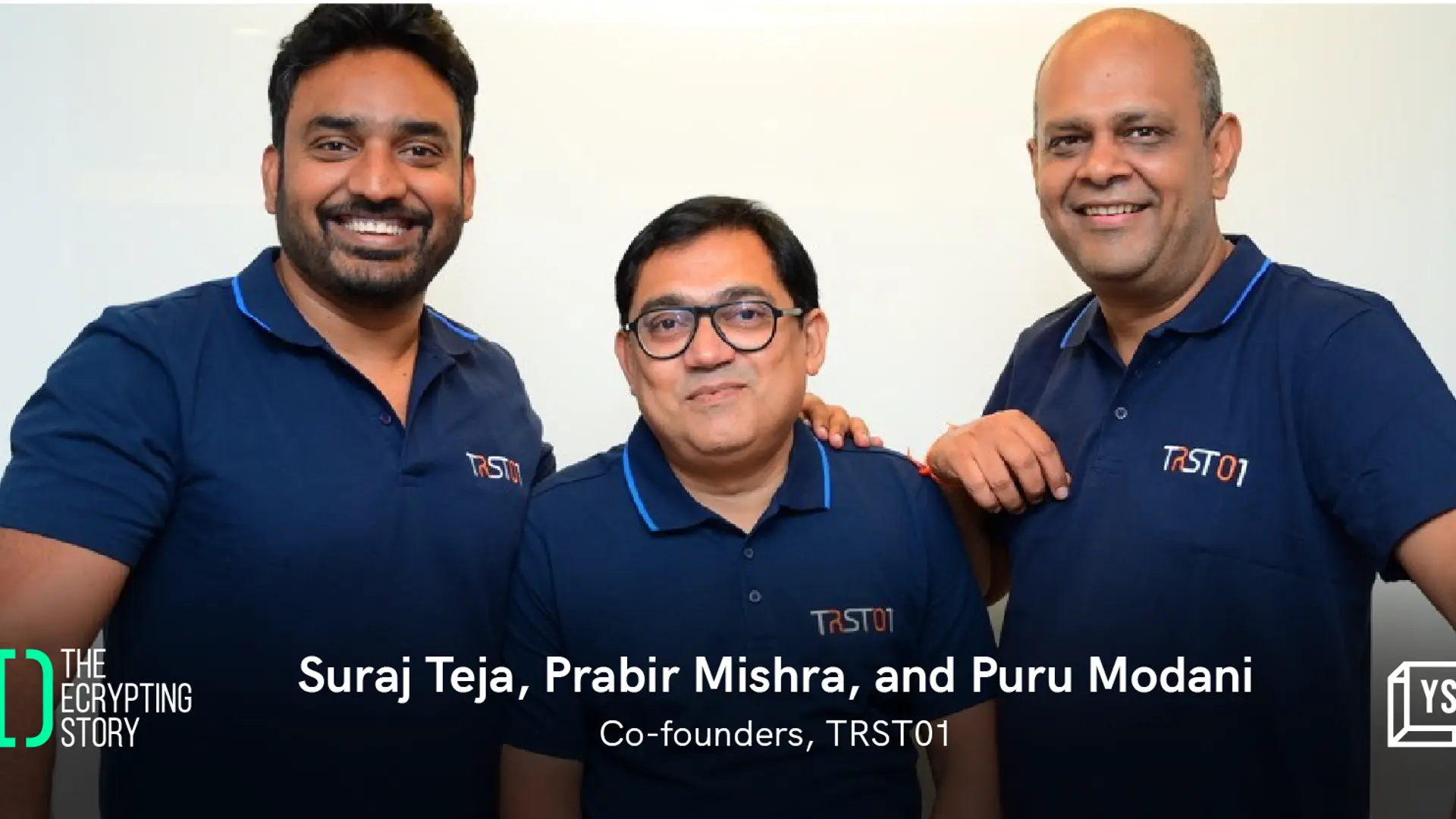Hyderabad startup TRST01 is tackling climate action through blockchain technology
Founded by investment bankers Prabir Mishra, Suraj Teja, and Puru Modani, blockchain startup TRST01 recently launched NFT tokens to digitise carbon and solar credits—Bhu and Arka.
In the race to combat the climate crisis, many countries have pledged to go carbon neutral. But that’s easier said than done. One of the major concerns is to implement green initiatives while maintaining the necessary agricultural and industrial output.
Numerous companies—Citi and IBM, among others—believe carbon offsetting and trading could provide a solution, where corporations eliminate their CO2 emissions by investing in carbon offset projects or attempt to remove carbon dioxide by planting trees and preserving forest creating offsets or credits.
These savings—or credits—can then be purchased by another individual or company, allowing them the right to produce a certain amount of carbon emissions. Each credit equals one tonne of carbon.
But the existing carbon market is perceived to be opaque, unorganised, and exclusive to big corporations, making it challenging for farmers, rural communities, and other people from lower socioeconomic levels to engage in this trade.
Since the market for carbon credits is so poorly regulated, dealers could also make dubious claims of carbon offsetting without implementation. But the global market for carbon offsets display no sign of slowing down, and is projected to be worth $35 billion by 2030.
Numerous blockchain startups have entered the space, looking for ways to reduce carbon emissions through NFTs. Recently, Polygon partnered with Klima DAO, which offers tokenised carbon credits. Other popular startups FlowCarbon, Moss, and Offsetra also created a buzz around the same.
Closer home, Web3 enthusiasts and investment bankers Prabir Mishra, Suraj Teja, and Puru Modani wanted to solve the lack of transparency in the carbon trading market while democratising access.
The trio launched TrayamBhu Tech Solutions () in 2019, a blockchain platform digitising carbon credits to make the market more accessible to all.
In a conversation with The Decrypting Story, Prabir says, “With blockchain technology, all the data is on-chain, traceable, and transparent, and we believe this could play a significant role in solving for climate action and agriculture."
However, the startup began by setting out to address food traceability using blockchain. “We tried to solve the issue by tracing the location of product and the date and time of the process through geo-fencing and geo-location. The certificates issued for these products are uploaded on the blockchain with embedded QR codes and anyone could trace the products. Next, we decided to focus on climate and agriculture projects,” he adds.

Blockchain startup TRST01 solves for lack of transparency in the carbon market. | Image source: Pixabay
Climate action through NFT tokens
TRST01’s three tenets are trust, transparency, and traceability. In April, TRST01 launched Bhu, a carbon offset NFT token, and Arka, a solar offset NFT token. The startup has also tied up with RubiX, a green blockchain protocol, as its technology partner for the same.
“In an effort to raise public awareness of the climate crisis, we are enabling the common man to buy and offset and contribute to climate action,” says Prabir.
The NFT tokens are currently available on several marketplaces, including OpenSea and Rarible and will be available on JupiterMeta in future.
"We do not interact directly with farmers or communities. Instead, we connect with project developers and aggregators, who work across a wide range of projects involving solar energy, hydropower, the reduction of methane gas, and others. After the projects are completed, carbon credits are produced, and farmers, rural women, residents, or small communities that the developer worked with receive the benefits," he claims.
One of the initiatives the startup worked is a solar project in Himachal Pradesh. It tied up with the developer of three solar plants—Dhar, Bhandari Ram, and Sankhyan—that replaced conventional fossil fuel-based plants in the area, generating 1.5MW of clean and renewable energy.
The carbon credits from the solar project were digitised into NFTs and sold at $10 per credit on NFT marketplaces. The income generated will be distributed among villagers and women the project developer worked with. The startup has sold 500 NFTs to date.
The founder claims that the climate projects not only work to address global issues but also to improve the standard of living. “Most of our projects have generated monetary income for farmers. For instance, our partner project developers track around 40,000 hectares of forest land and aim to reduce methane gas. Each hectare may generate 3-5 carbon credits. The total may go up to 100k-200k carbon credits. The farmers will get around Rs 1,500- 2,000 per acre. Carbon credits generated from the reduction of methane gas are digitised as Bhu NFT tokens.”
At present, the startup has a team of 35 members.

In April, TRST01 launched Bhu, a carbon offset NFT token, and Arka, a solar offset NFT token.
BaaS
The startup follows Blockchain as a Service (BaaS) model, allowing buyers to build applications and digital services on a distributed network while it supplies the infrastructure and blockchain building tools. Its clients include corporations, governments, and other organisations building green projects.
It clocked total revenue of Rs 50 lakh in the last one year.
“In the first project, we provided blockchain solution for PDS (public distribution system) traceability to Government of Orissa and we were paid Rs 5 lakh for it. It was implemented through CSM Technologies, Bhubaneswar,” says Prabir.
In future, the startup aims to expand its operations in the US. “Currently, we are working on 8-10 projects and have over 15 clients on board,” says Prabir.
The startup is also in talks to work on several governmental projects. The co-founder says, “We are discussing with Himachal Pradesh state government to collaborate for a climate project and also partnering with Haryana state government on food traceability through STPI (software technology parks of India).”
TRST01 also aims to collaborate with the likes of Coromandel Agrico Group and Green Irrigation, among others for its agricultural and seed traceability projects.
In February, the Hyderabad-based startup raised Rs 4.2 crore in a seed round led by US-based Octave Ventures.
Edited by Saheli Sen Gupta





